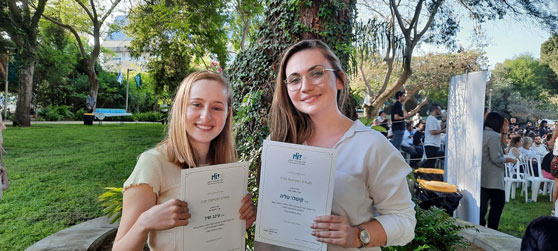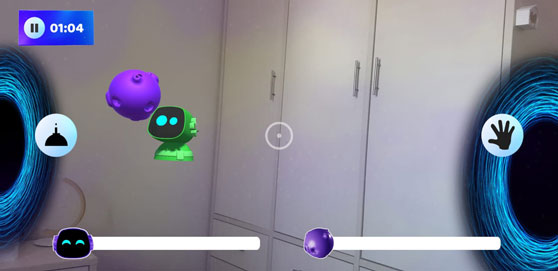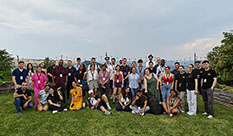More:
News & Stories
Augmented Reality Equips Younger Generation with Soft Skills
A final project culminating 3-year undergraduate degree in Instructional Technologies helps train pre-teens in practical management skills.

Screenshot from the project
Innovative technological capabilities are already routine in the daily life of younger generations. Just take a glance at the games they play and the way they study to come to this conclusion. But what happens when these same kids acquire soft skills that can help better prepare them to succeed in their future careers? That is exactly what two students from the Faculty of Instructional Technologies set out to find out when they developed a unique application which intends to do exactly that!

From left to right: Shir Einav and Talia Kotler
Talia Kotler and Shir Einav, 3rd year students in the Faculty of Instructional Technologies talk about their final project, which was supervised by the Faculty’s Student Project Coordinator, Yanai Zaguri, with programming development from Tal Klein. Both Zaguri and Klein are lecturers in the Faculty.

Screenshot from the project
The app deals with the training and development of soft skills among children aged 9-12 using an AR-based gaming platform. AR, or Augmented Reality, is a technology through which graphic virtual elements are embedded on top of the real physical environment.
“As part of the final project, we developed an app that includes three AR-based games, each focusing on a different soft skill: adaptation to change, effective listening and logical thinking.”
The idea for the project was inspired at the hackathon organized by HIT Future: Center for Innovation and Entrepreneurship entitled "The FUTURE Challenge" which took place in May 2020. Yael Tal and Tal Lindenfeld, 4th year students from the Faculty of Design, participated in the project at that time.
After the hackathon, Yael and Tal decided to continue to develop the project and submitted it as a proposal for a final project in the Faculty of Instructional Technologies.

Screenshot from the project
Talia and Shir continue: "We decided to partner with Yael and Tal. During the planning and characterization phase of the games on the platform, we worked as a team –but ultimately, in light of our respective backgrounds, we divided the roles so that Yael and Tal were responsible for the design and visibility of the platform and we were responsible for the actual product development.”
The development used a "Unity" engine and the "Google ARCore" development kit which allows the development of AR-based applications for Android devices”.
The evaluation process of the project is currently underway, including an expert interview with Prof. Gila Kurtz, Dean of the Faculty of Instructional Technologies, and a usability test for a group of 13 children in the target audience.
"During the observation phase, we saw that the kids were very enthusiastic about AR technology and were highly motivated to play the game.
’Working with AR technology was very challenging’, reports Talia and Shir. “Although it is highly innovative, not all functions work smoothly and there are technical bugs that we have no control over. However, we are confident that in the coming years, the technology will continue to improve and gain momentum and will be used in many areas, including the vast realm of game development and learning.

Screenshot from the project
The main objective of the project is to improve the capabilities of the younger generation by developing their capacity for adaptability, listening and thinking at an early age, and ensuring that they have the skills required for success in the highly demanding and dynamic 21st century job market. Soft skill development is not something ordinarily taught in the classroom, let alone through Augmented Reality technology. If our project succeeds, a new training avenue will be provided that can accomplish this goal, opening up new opportunities and tapping new potential of younger generations.”
Posted: 02/08/2021
Last updated: 03/08/2021
- News & Events
International Week of Interdisciplinary Studies and Academic Collaborations in Crete
A substantial delegation of 16 students and four faculty members from HIT Holon Institute of Technology participated in week-long international activities and events at HMU-Hellenic Mediterranean University in Crete. ...


 Additional programs
Additional programs
